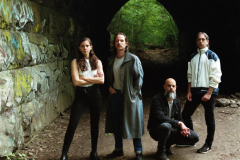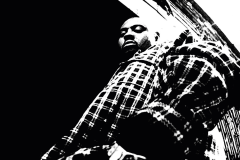The unfortunate passing of a friend. The ending of not only his band, but also a relationship. The relocation to a new city. Fallow Land’s Whit Fineberg began to start feeling like he was directionless. However, these dark moments that culminated in such a short span of time also forced Fineberg to be more inspired than he ever has before. He soon began writing more than he had in years and crossed paths with bandmate Evan Veasey back home in Ann Arbor.
For their debut EP Pinscher, Fineberg and Veasey worked attentively together with Chris Bathgate on truly understanding the importance of each song. Once Fallow Land were pleased with their newfound keen sense of their art, they went to record at High Bias Studios with the help of audio engineer Chris Koltay, mixing by Matt Bayless, and mastered by Ed Brooks (Cursive, Death Cab for Cutie).
Ghettoblaster recently caught with Fineberg and Veasey to talk more about Pinscher, how the duo met in Ann Arbor, and the future. Here’s what the members of Fallow Land said.
I’ve seen online that some outlets are labeling Fallow Land as a “math rock” band. Would you agree with that?
Fineberg: We have definitely drawn influence from math rock. When I was writing a lot of the songs on Pinscher I was listening to Bearcubbin and Don Caballero. That being said, I wouldn’t say we are explicitly a math rock band. I wouldn’t say we are explicitly anything. We just pick elements from the music we like and adapt it to fit our compositions.
Veasey: Yes and no. Both Whit and I listen to math rock a fair amount so I think that some of that influence has made it into the music. For example, the first song on the EP, Yang, switches between 4/4 and 6/8 time signatures, and a new song we are working on is mostly in 5?8. However, I don’t think I would call us math rock. Even though our music has some of the rhythmic complexity of that genre, I think we lack the technicality of real math bands. I would consider us more of a mix of several different things. Like maybe emo-math-shoegaze or something like that.
Fineberg-you found inspiration with your writing when you were at a pretty low point. From the untimely death of a friend to the dissolution of not only a relationship but your previous band, what was it that inspired you?
Fineberg: I started writing Pinscher out of necessity. I was faced with all of these really trying scenarios that were incredibly complex and overwhelming. Choosing to hide from them would inevitably result in self-destruction so I had to come up with a safe way to face all of these issues and try to understand them. Whenever I wasn’t in class I was recording demos. It’s really what kept me together.
Veasey-what was it about Fineberg that intrigued you to join him in setting up Fallow Land?
Veasey: I think what drew me to working with Whit initially was his great music taste and career ambitions. Prior to playing with Fallow Land I had played in 4 or 5 other bands, and I learned a lot about playing with other people and the creative process by doing that. However, none of those groups were particularly serious. We would play a few shows around town and practice a lot, but that was basically it. When Whit came to me asking if I was interested in putting a new group together, he was already planning a tour for that summer and talking about recording a record within the next year. I am aspiring to make music my sole source of income, so meeting someone with similar ambitions was exciting. Also he happened to like a lot of music I liked and wrote good songs, so it just kind of worked out.
Fineberg-I read that producer Chris Bathgate helped you go about thinking your own art in a different way. What was it that Bathgate showed or told you?
Fineberg: What has always stuck me about Chris’ work is his ability to milk every idea for all that its worth. He has this understanding of arranging music that’s incredibly sophisticated. Chris finds the most powerful aspect of every section of a song and figures out how to amplify it. Chris frequently asked me, “What’s the most important moment of this section?” Or, “What’s the high point of this song?” Chris taught me to break a song down to its essential core and rebuild from there.
Veasey-were you aware Fineberg’s work around Ann Arbor before the two of you met?
Veasey: Yeah, I had been aware of Whit’s different projects and things for a number of years before we started Fallow Land. We both went to the same high school and I had some friends who knew Whit and were fans of his band Bad Television. I also went and saw Bad TV a couple times my freshman year before we started the group. We were running in the same circles during most of that time.
Fineberg-you were living in Chicago but continued to drive up to Ann Arbor to play music frequently. For the band, how special is Ann Arbor to you two?
Fineberg: Ann Arbor is where I developed as an artist. I started playing shows at the Neutral Zone (a local teen center) when I was fourteen. It’s a really weird scene here. There are a ton of fantastic musicians and artists, but in the past couple of years many of the venues have begun to close down. Unfortunately there isn’t the same degree of appreciation for art from the public as there is in many other cities. That being said, I feel deeply rooted in the scene here and the musicians I have access to collaborate with are fantastic.
What is the meaning behind naming the EP Pinscher and having the EP artwork a picture of this certain breed of dog?
Veasey: There isn’t really any meaning. We actually found the image of the Doberman before we had decided on the title for the EP. We like the photograph so much that we decided to use it as our album cover and the title Pinscher just seem to fit.
Fineberg: In truth, the picture came before the concept to name the EP. My friend Andrea Calvetti actually took the photograph of his own dog. We met because he was good friends with one of my roommates in Chicago. He actually lived on the floor above us in our apartment complex. Andrea is an incredible photographer and I was scrolling through his photographs on Facebook and I saw the photograph of his dog. I was struck by the extreme power and potential for chaos that existed within the dog, yet it is exceptionally calm in the photograph. One of the ideas illustrated throughout the EP is staying calm when chaos is raging inside of you. Writing all these songs in the first place was an attempt to stay calm in the face of chaos. There is something very empowering about going through something that’s totally insane and coming out ok on the other end.
The ending to the band’s recently released video for the single “Faux” is rather intriguing. For those who watch the video, you are left wondering after seeing the twist. I’m sure that there’s several different ways to go about understanding what the ending entails. What is the meaning behind it?
Fineberg: We can be destroyed by our desire to be someone else.
Veasey: “Faux” is all about changing every aspect of yourself at an almost molecular level to please people you care about, so we wanted our video to reflect that theme. Basically, when the main character in the video sees his reflection, he sees another person looking back at him. When his lover turns his body over in the water and sees a stranger’s face, she is seeing a part of her partner that has died. So I guess it was almost like a part of himself committed suicide.
Is there talk on doing a longer LP for the follow up to Pinscher?
Fineberg: That’s definitely the plan. We’ve begun writing a couple songs that we anticipate being on the full-length. That being said, we kind of rushed through some of the steps while recording Pinscher, primarily due to budget constraints and partially due to inexperience, and that’s something we don’t want to do again. We want to take our time on the LP and make sure we get everything right.
Veasey: We are planning on beginning to write a new record right after we release this EP. Hopefully we will get back in the studio in the next 6 or 8 months. We learned a lot about the process by recording and releasing this record, so we are excited to go even further with the next one.
With Fallow Land consisting of just two members full-time, do you ever find yourselves wanting to expand?
Fineberg: There are positives and negatives to the way we’ve been doing things. Musicians tend to be really busy and having to put everything on hold for one of the member’s schedule is something that can really stunt the growth of the band. We are happy with the musicians we are working with right now, Evan Laybourn (on drums) and Scott Kendall (on bass). I think everything will become clearer as we begin to record our follow-up LP.
Veasey: We really like playing with Scott Kendall and Evan Laybourn, and hope to continue working with them in the future. However, that being said, we think there are a lot of different advantages to having things organized the way they are now. Honestly, only time will tell. We are definitely open to the possibility of adding new people as permanent members though.
Fallow Land’s debut Pinscher is out June 30.
(Visit Fallow Land
Fallow Land Website
Facebook
Twitter
Instagram)








Social Media